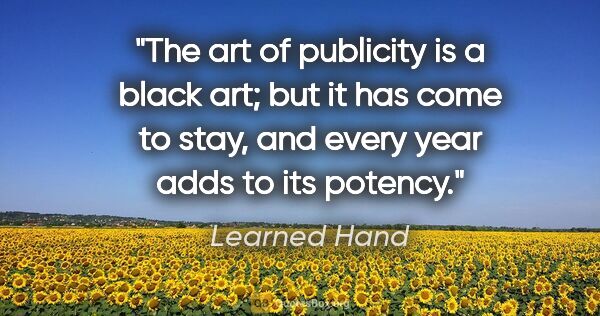Public Art Quotes

Interviewer: “Andy do you feel that the public has insulted your art?”
Andy Warhol: “Uh no.”
I: “Why not?”
AW: “Uh well I hadn’t thought about it.”
I: “It doesn’t bother you at all then?”
AW: “Uh no.”
I: “Well do you think that they have shown a lack of appreciation for what pop art means?”
AW: “Uh no.”
I: “Andy do you think that pop art has sort of reached the point where it’s becoming repetitious now?”
AW: “Uh yes.”
I: “Do you think it should break away from being pop art?”
AW: “Uh no.”
I:...
Andy Warhol
The art of not reading is a very important one. It consists in not taking an interest in whatever may be engaging the attention of the general public at any particular time. When some political or ecclesiastical pamphlet, or novel, or poem is making a great commotion, you should remember that he who writes for fools always finds a large public. A precondition for reading good books is not reading bad ones: for life is short.
Arthur Schopenhauer
One might be tempted to extol as an advance over Sophocles the radical tendency of Euripides to produce a proper relation between art and the public. But "public," after all, is a mere word. In no sense is it a homogeneous and constant quantity. Why should the artist be bound to accommodate himself to a power whose strength lies solely in numbers? And if, by virtue of his endowments and aspirations, he should feel himself superior to every one of these spectators, how could he feel...
Friedrich Nietzsche
In university courses we do exercises. Term papers, quizzes, final examinations are not meant for publication. We move through a course on Dostoevsky or Poe as we move through a mildly good cocktail party, picking up the good bits of food or conversation, bearing with the rest, going home when it comes to seem the reasonable thing to do. Art, at those moments when it feels most like art -- when we feel most alive, most alert, most triumphant -- is less like a cocktail party than a tank full...
John Gardner

she imagined how in the chambers of the mind and heart of the woman who was, physically, touching her, were stood, like the treasures in the tombs of kings, tablets bearing sacred inscriptions, which if one could spell them out, would teach one everything, but they would never be offered openly, never made public. What art was there, known to love or cunning, by which one pressed through into those secret chambers? What device for becoming, like waters poured into one jar, inextricably the...
Virginia Woolf
- 1
- 2